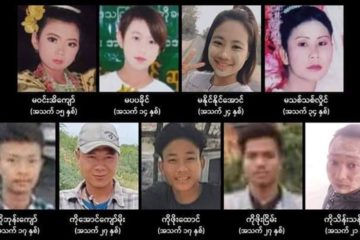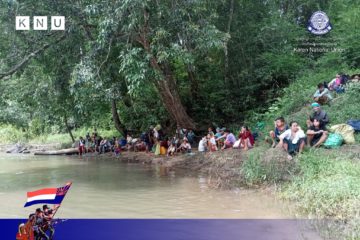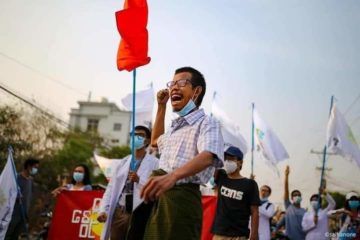by Myanmarese

Today June 20th marks the World Refugees day
Myanmar is going through a violent tumultuous political landscape right now and has seen hundreds and thousands of civilians displaced by conflict. Many are denied access to basic healthcare, the right to education and essential items such as food and drinking water.
The worst affected are in ethnic states such as Chin State, Karenni (Kayah) state, and currently in the Sagaing region. Violence has erupted into the Bamar heartlands and cities. Many youths and educated professionals have fled into ethnic armed organisation controlled territories to avoid persecution from junta troops as torture and death is reported and documented in detention centres and prisons.
The civil war in Myanmar is known to be one of the longest running civil wars in the world that started from the beginning of Myanmar’s or Burma’s independence from the British. Since then the Myanmar Tatmadaw has used extreme brutality including rape as a weapon in ethnic states. Thousands of Burmese ethnic minorities have fled into other countries as refugees and international headlines were made when the Myanmar military committed genocide against the Rohingyas, a Muslim minority in Rakhine state, which saw thousands and thousands of them fleeing from Myanmar into neighbouring Bangladesh, risking life trying to reach Malaysia and Indonesia whom they expected fairer treatment since these countries are Muslim countries themselves. But expectations fell flat when they also receive the same level of discrimination, persecution minus the torture from these countries. Bangladesh’s solution to the Rohingya crisis is to put them in refugee camps without right to education, work or basic human rights. Barbed wire surrounding these camps led to many of the refugees being burnt alive unable to escape the regular fires due to the barbed wire. Thousands are being sent to an island in the middle of the Indian Ocean unable to escape. It’s like a Nazi concentration camp without being gassed.
In Malaysia, thousands of Myanmar refugees including Rohingya refugees live without proper documentation and are regularly targeted by authorities to have their homes raided and then risk deported back to Myanmar where they risk further persecution. During the Covid pandemic in Malaysia, a lot of the refugees lost their jobs and when the Malaysian Movement Control Order (MCO) was issued as a part of the Covid pandemic control in Malaysia, many refugees were unable to seek work and risked hunger and arrest. Caught between a rock and a hard place, some committed suicide.
During the NLD government in Myanmar, the authorities issued an agreement that they will accept Myanmar people returning home free of charge and given free flights. Whether this also included the Rohingyas is uncertain as they were persecuted under the NLD government. Rohingya people also faced racial discrimination in Malaysia as they are seen as ‘pests’ and a burden on society. This is the same in India where Hindu nationalism is being endorsed by Modi’s government. Hindu nationalists attacked Rohingya refugees in India crying the same slogans about Islam taking over the world.
Today 488 CSOs called on the United Nations and the international community to stop the Myanmar military using the weaponization of humanitarian aid. Reported from several different cities particularly in ethnic states such as Mindat, the Myanmar military are using civilians as part of their 4 cuts strategy to cut off resources of civilian defence forces. This has included obstructing humanitarian aid such as food, drinking water and medicines as well as medical assistance to internally displaced people in forests and to those trapped within cities and towns. This warfare tactic known to be used as a systematic repression tool by the military is now considered a war crime under the UN resolution 2417 adopted in 2018 after man-made famines were induced by security forces in Syria and South Sudan.




For further information on the plight of Burmese refugees, Pulitzer award winning journalist Emily Fishbein has a good thread on Twitter: https://twitter.com/EmilyFishbein11/status/1406448564482367489?s=20
“On 30 April, Home Minister Hamzah Zainudin announced that Rohingya have “no status, rights or basis to state demands from the Malaysian government”, which “does not recognise their status as refugees but as illegal immigrants holding UNHCR cards”.
TNH received reports of Rohingya who were fired from their jobs following the government’s announcement, including 38 dismissed on 4 May from a construction site in Penang state.
“We apologised and asked several times for help and to stay one more week because we had nowhere to go during the MCO, but [our employers] rejected our request and we were forced to leave,” one of the dismissed workers told The New Humanitarian.”
“During the global pandemic, we are becoming hopeless,” said La Seng of the Kachin Refugee Committee. “I would like local people to understand that we fled to Malaysia not because we don’t want to stay in our country, but to save our lives. When our country becomes peaceful, we will go back.”
“We [refugees] would like to request not to be labelled as illegal immigrants… for the Malaysian government to protect us.”
The Indian Government, Hindu Nationalists, mismanaged the Covid pandemic control. Not only are they trying to silence criticism on social media but are using the same tactics they used during their election campaign and this is by whipping up hate against the already marginalised Rohingya refugees.
“Though the Indian government officially does not favour or discriminate against any refugee group, over the past four years, the Rohingyas have become a political trump card that the ruling Bharatiya Janata Party uses to rake up hate campaign against them, projecting them as terrorists and threat to national security. The hate campaign reaches a crescendo every time an election is approaching.
“This was seen just before West Bengal assembly elections earlier this year when Rohingyas were targeted in their settlement in Jammu where they had been staying peacefully for many years. Abdali blames toxic hate that is being spread by mainstream media against the Rohingyas, at the best of the far-right wing elements. “Round the clock news channels are playing news against the Rohingyas. Rohingyas were in a very better condition in Jammu earlier, getting jobs, till the time it was propagated in Jammu & Kashmir that these are illegal immigrants taking away our jobs. Then suddenly they stopped getting any work and their livelihood was taken away. Before that they were very well settled, peacefully working as labourers, as cleaners, as daily wagers. There was no problem at all. That is how you propagate and make the host community hate the population who is living there peacefully,” he says.
Many fear that this hate campaign is bound to continue for the foreseeable future as the ruling Bharatiya Janata Party finds itself in a tough spot over the massive mishandling of the second wave of Covid-19. So to distract the attention, they would continue to raise fear and hate about Rohingyas, they say.”
https://www.nytimes.com/2019/06/14/technology/facebook-hate-speech-rohingya-india.html
During India’s recent national elections, Mr. Salim said, he saw Facebook posts that falsely accused Rohingya Muslims of cannibalism go viral, along with posts that threatened to burn their homes if they did not leave India. Some Hindu nationalists called the Rohingya terrorists and shared videos on the social network in which the leader of India’s governing Bharatiya Janata Party vowed to expel the minority group and other Muslim “termites.” A week ago, new posts popped up falsely accusing the Rohingya of killing B.J.P. workers in West Bengal.
https://mediaindia.eu/politics/world-refugee-day-2021-rohingyas-struggle-for-survival-in-india/
India’s new citizenship law discriminating Muslims but it is a Hindu nationalist strategy and can be used against the Rohingya muslims: https://www.dw.com/en/one-year-of-indias-citizenship-amendment-act/a-55909013
But it isn’t only the Rohingya muslims who face persecution. Due to the recent escalation of violence against Karen people including daily military airstrikes on villages, thousands of Karens have fled or tried to flee into neighbouring Thailand who has for years hosted thousands of them in refugee camps along its border. They also face dire needs of basic humanitarian assistance such as shelter, food, medicines and drinking water. Journalists are prevented from holding interviews with the refugees by Thai authorities and humanitarian aid is often blocked. It is reported as well that the refugees are turned away from the border by Thai soldiers despite the constant threat to their lives due to the crackdowns by the Myanmar military against ethnic communities. Despite places of worship being places considered sanctuaries for people fleeing from conflict, the Myanmar military has bombed and killed civilians as well as targeted volunteers and healthcare workers who are assisting people displaced in jungles.
“The surge in IDPs and threat of serious refugee outflows worsen an already very bad situation. Myanmar is the reason Southeast Asia remains the world’s fifth-largest source of refugees after Syria (6.6 million), Venezuela (3.7 million), Afghanistan (2.7 million) and South Sudan (2.2 million), according to the United Nations High Commissioner for Refugees.”
Decades after millions poured out of Vietnam, Cambodia and Laos, Indochina is largely at peace. But Myanmar had pushed 1.1 million refugees over its borders even before the coup. At the start of the year, the UNHCR listed 1.9 million Burmese persons of concern, including IDPs.
The current situation is confused, but tallying various sources by the end of May, there were probably between 100,000 and 120,000 more IDPs than in January after armed minorities including the Kachin, Chin, Shan, Karen and Karenni resumed hostilities.
On top of this, in the weeks before the coup, the UNHCR circulated a gloomy overview of the plight of Myanmar’s Rohingya. The mainly Muslim minority, once concentrated in Rakhine State in the country’s northwest, now makes up 78% of refugees from Myanmar. The report said discriminatory laws had “stripped nearly all Rohingya of their citizenship, making them the largest identified stateless community in the world.”
In Rakhine, 600,000 Rohingya remain, 144,000 of whom live in 21 displacement camps. Then there are nearly 886,000 — 52% of them children — squeezed into 34 refugee camps, mostly in the Teknaf and Ukhia subdistricts of Cox’s Bazar, one the poorest corners of overcrowded Bangladesh.
Thousands have also fled to Malaysia and India, along with small clusters in Nepal, Thailand and Indonesia, where 400 Rohingya were rescued from the sea off Aceh by sympathetic Muslim locals.
Due to intense conflict between the Arakan Army and the Tatmadaw between 2019-2020, thousands of civilians also fled from their homes and are still displaced to this day, scared to return home and are vulnerable to criminal activities and harsh weather conditions.
The international community including ASEAN countries and the UN has a responsibility to help resolve the crisis in Myanmar. With such a perplexing number of refugees from one country and in the heart of Asia, neighbouring countries will only benefit for a more stable and democratic Myanmar where its ethnic communities can live in peace and harmony. It is clear the Myanmar military regime has failed miserably in holding the country stable and has challenged the legitimacy of the ASEAN as its member repetitively.
This is a fundamental point in my opinion especially if neighbouring countries who support and supported the Myanmar junta cannot give its refugees basic human rights after they had to escape from the Myanmar junta’s violence in its territories.
At the UN General Assembly on Friday, the international community has observed that Myanmar’s neighbours: India, Nepal, Bangladesh, Thailand, China and Laos have abstained from voting for democratic transition in Myanmar and a halt to weapons. While Malaysia and Indonesia have both voted for the Myanmar people, they must also stop the discriminatory attacks against refugees by their politicians, police force and tackle the xenophobia perpetuated by Malaysians who are led by misinformation through various media channels including on social media. This is my hope for Malaysia.
My comments on India on the other hand. I only wish that Hindus in India who vote for Modi realise how dangerous he is in propagating ethnic and religious divisions in his country, as well as supporting authoritarian governments around the world, using the same tactics as those authoritarian governments to crush dissent and criticism against his authority. India should be respected as a democratic country and a leader in many ways. But after Modi gained power, it is rapidly losing its respected democratic status.



0 Comments